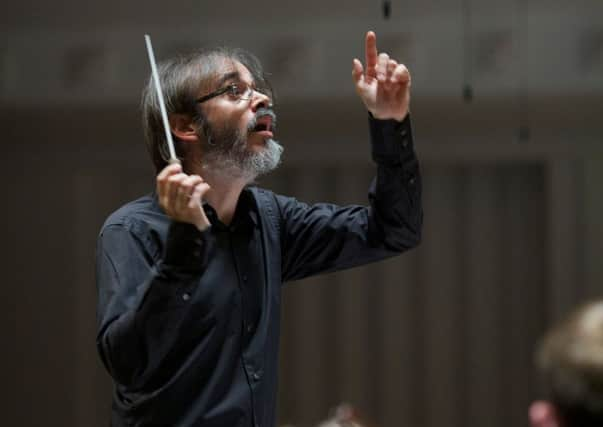Music review: Tectonics festival


Tectonics ****
City Halls & Old Fruitmarket, Glasgow
This was an installation (no title supplied) by sonic artists Pierre Berthet and Rie Nakajima, whose collaborations centre on teasing out real or sympathetic vibrations from everyday objects:
metal cans trembling at ceiling height; broken eggshells suspended at eye level; even floating paper cushions, lurking antagonistically in corners at ankle level.
Advertisement
Hide AdAdvertisement
Hide AdA box on the floor said “lift the lid”. I obliged, but in this low-level sound environment the pebble holding it down crashed to the floor. “Can’t take him anywhere” joked the nearby attendant.
What does all this tell us about a festival, now in its fifth year, curated by BBC SSO principal guest conductor Ilan Volkov and creative producer and director Alasdair Campbell, which celebrates music at the extreme end of the avant-garde?
I found it a usefully intimidating starting point to the series of back-to-back programmes that filled both Saturday and Sunday. For in most of these, the challenge was to listen oh-so-carefully to works that indulge in extremes; to ask ourselves, are we being intellectually conned, or is this structured sound, no matter how absurd it might seem, bona-fide music?
Take some examples. Saxophonist Roscoe Mitchell stepped up to the Old Fruitmarket stage in what looked like a dosser’s anorak. He casually threw it off, and launched into a surreal polyphony of squeaks, remarkable for displays of circular breathing that helped him sustain an unending moto perpetuo. It was mesmerising once a groove kicked in, and the mind attuned itself to the driving pulse of this breathless stream of thought.
Next up, composer John Chantler and filmmaker/musician Luke Fowler, whose electro-acoustic collaboration seemed the antithesis of Berthet’s and Nakajima’s installation, an unrelenting and invasive sound assault guaranteed to rattle your bones. Musically, it was strangely old hat.
On to the main concert hall, and the relative ordinariness of American ensemble (two pianos, two percussion) Yarn/Wire. They struck up Andrew McIntosh’s Hyenas in the Temple of Pleasure (a Bartok-esque piano duo, with its colliding scales and conservative astringency, increasingly offset by exotically charged percussion), and Thomas Meadowcroft’s Walkman Antiquarian, motorised nostalgia fired by a fusion of electronically sampled extracts of old records and looped musical response.
The main evening events featured the BBC SSO, probably the only orchestra in Scotland brave enough to attempt a 45-minute improvisation, which it did on Saturday with experimental jazz trio, The Necks.
Advertisement
Hide AdAdvertisement
Hide AdThe result was captivating. The Necks’ bassist Lloyd Swanton set up a single note riff, Chris Abrahams responded with another on piano, drummer Tony Buck found infinite subtleties in his percussive role. But it was the SSO’s utter lack of self-consciousness, its pungent response to Volkov’s playful hand gestures as he shaped and manipulated the mass improvisation machine, that lifted this performance to euphoric heights.
In truth, it left what had gone before - the post-Messiaen ornithological minimalism of François-Bernard Mâche’s Kassandra, the softly spun sound exploration of Linda Catlin Smith’s Wilderness and rock cellist Lori Goldston’s lugubriously undernourished That Sunrise for cello and orchestra - as fainter memories.
Sunday’s finale also featured the SSO, initially only in part, where a handful of its members formed the walkabout ensemble in Shiori Usui’s wacky performance piece from scratch, the composer’s grotesquely enacted vocals reliving her own battle with eczema.
The main orchestral programme explored Lawrence Dunn’s distant bluesy Ambling, waking, Catlin Smith’s densely beautiful Adagietto and James Saunder’s rather silly alternate between attention and ease, effectively a game of Simple Simon where the orchestra gives improvised responses to words shouted out be the composer. It didn’t get the laughs it was meant to.
Best part of the evening was Roscoe Mitchell’s Conversations, based on transcriptions from his CDs of the same name. In this high voltage version for orchestra and soloists (Mitchell, himself, and flautist Gianni Trovalusci), the joint jumped big time. Nothing like hyperactive sax to send you home on a high.